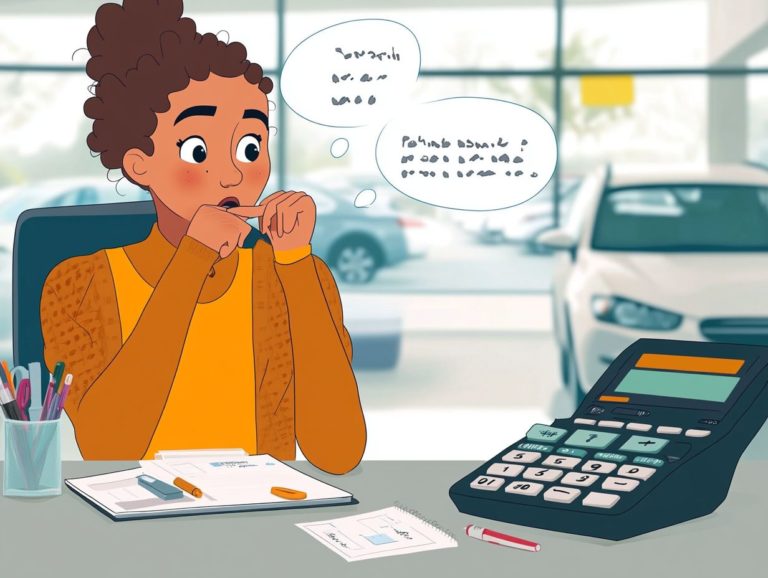7 Negotiation Techniques for First-Time Buyers
Buying your first home is an exhilarating yet overwhelming journey, particularly when it comes to negotiating the best deal. Grasping how to navigate this vital stage can significantly influence your ability to secure your dream property without breaking the bank.
This article delves into seven essential negotiation techniques specifically designed for first-time buyers. From conducting thorough research and crafting an irresistible offer to recognizing the right moment to walk away, these strategies will equip you to negotiate with confidence and effectiveness.
Get ready to transform your home-buying experience!
Contents
- Key Takeaways:
- 1. Do Your Research and Know Your Budget
- 2. Understand the Market and the Property You Are Interested In
- 3. Make a Strong First Offer
- 4. Ask for Repairs or Credits
- 5. Be Willing to Walk Away
- 6. Negotiate Closing Costs and Fees
- 7. Consider Using a Real Estate Agent
- What Are the Benefits of Negotiating as a First-Time Buyer?
- What Are Some Common Mistakes to Avoid When Negotiating as a First-Time Buyer?
- How Can a First-Time Buyer Prepare for a Negotiation?
- What Are Some Strategies for Negotiating a Lower Price?
- How Can a First-Time Buyer Negotiate for Additional Inclusions or Upgrades?
- What Are Some Tips for Negotiating with a Seller?
- Frequently Asked Questions
- What are the 7 negotiation techniques for first-time buyers?
- How can preparation help in negotiation for first-time buyers?
- Why is active listening important in negotiation for first-time buyers?
- How does asking questions benefit first-time buyers in negotiations?
- Why is offering multiple options a good negotiation technique for first-time buyers?
- How can silence be used as a negotiation technique for first-time buyers?
- Is it okay for first-time buyers to walk away from a negotiation?
Key Takeaways:

Do your research and set a budget before negotiating. This will give you a solid foundation and help you make more informed decisions.
Understand the market and the property you are interested in to have a better sense of its value and potential negotiation points.
A strong first offer can shape your negotiation outcome and potentially lead to a better deal.
1. Do Your Research and Know Your Budget
Before you start negotiating, it’s essential to conduct thorough research and establish a clear budget to guide your financial decisions especially when buying property in a seller’s market.
Understanding property values in your area offers valuable insights into fair pricing. Engaging with mortgage brokers grants you access to pre-approved financing and helps you comprehend your borrowing capacity, allowing you to negotiate with confidence.
By aligning your budget with accurate property assessments and financing options, you’ll navigate discussions with sellers more effectively. This strategic approach enhances your bargaining position while ensuring you stay within your financial limits. Ultimately, this leads to a more satisfying purchase experience.
2. Understand the Market and the Property You Are Interested In
A comprehensive understanding of the current market and the specific property you re interested in is essential for effective negotiation. This knowledge gives you the power to gain insights into property values and buyer needs within a competitive landscape.
Diving into recent sales data uncovers emerging trends that reveal the level of demand in various neighborhoods. Recognizing the dynamics of a seller’s market offers invaluable insights into pricing strategies and buyer behavior.
Equipped with this information, you can approach negotiations confidently knowing precisely when to make a compelling offer or when to hold back and observe market shifts.
Understanding these elements allows for more strategic bidding and strengthens your overall position. This ultimately leads to more favorable outcomes.
3. Make a Strong First Offer
Making a strong first offer is a key moment in your negotiation. It sets a price anchor that leverages the anchoring effect to influence the discussions that follow and helps you achieve your desired price.
It’s essential to craft this initial proposal thoughtfully because it establishes a reference point for the conversation while creating a psychological impact on the other party. By presenting a well-researched and compelling first offer, you can shape perceptions and expectations moving forward.
This strategy creates a framework where all future dialogue is influenced by that initial figure. It prompts your counterparts to reassess their stance based on the anchor you’ve established. Thus, grasping the nuances of price anchoring empowers you to guide conversations effectively toward outcomes that favor your interests.
4. Ask for Repairs or Credits
Requesting repairs or credits during negotiations can boost your purchase value. This is especially true after a home inspection reveals necessary fixes that affect your closing costs.
When discussing these issues, balance assertiveness with respect. Clearly outline the problems based on the inspector’s findings to establish credibility.
This method strengthens your position and encourages open dialogue. It makes discussions feel collaborative rather than confrontational.
Instead of making aggressive demands, suggest reasonable adjustments or credits. This keeps the relationship with the seller positive, leading to smoother negotiations and a more satisfying transaction.
5. Be Willing to Walk Away

To negotiate effectively, be ready to walk away if the terms don’t meet your expectations. This gives you power in counter-negotiations and enhances your emotional intelligence.
Your willingness to walk away shows confidence and shifts the power dynamics. This may prompt the seller to reconsider their position.
Having alternative options reduces the emotional weight of negotiations. This helps you think clearly and make better decisions.
When the seller sees your confidence, they may be more open to adjustments. This creates a constructive dialogue leading to mutually satisfying results.
6. Negotiate Closing Costs and Fees
Negotiating closing costs can significantly affect your budget. Using effective strategies can help you secure better pricing from the seller’s agent.
Understanding common fees like title insurance and appraisal costs is crucial. This knowledge helps you identify negotiable expenses.
Engage in open discussions with the seller’s agent to find areas of flexibility. Presenting comparable sales data can strengthen your negotiating position.
A well-prepared approach tailored to your situation can lead to a more beneficial financial outcome.
7. Consider Using a Real Estate Agent
Hiring a qualified real estate agent can enhance your negotiation process. They provide leverage and foster a trusting relationship with the seller.
Real estate agents have insights into market trends and strategies that can shape your deal. They understand property values and local conditions, helping you spot opportunities.
This professional presence creates a balanced negotiation environment. It allows you to base decisions on facts instead of emotions.
This partnership gives you confidence and clarity throughout the buying process.
What Are the Benefits of Negotiating as a First-Time Buyer?
Negotiating as a first-time buyer offers many benefits. You can improve your understanding of your feelings and enhance your communication skills. These improvements can lead to successful negotiation outcomes that shape your financial future.
This journey sharpens your ability to express your needs and concerns clearly. It also provides valuable lessons that you can use in future negotiations, whether for property or other significant purchases.
By engaging in open dialogue with sellers, you can uncover their motivations behind pricing. This can lead to potential savings when you make well-researched offers. Building rapport with sellers increases your chances of securing favorable terms, transforming the purchasing process into a more advantageous and less stressful experience.
What Are Some Common Mistakes to Avoid When Negotiating as a First-Time Buyer?
First-time buyers often stumble during negotiations by not fully understanding their own needs and skipping essential techniques, such as those outlined in strategies for negotiating with private sellers, that could lead to better terms.
To make the process easier, start by defining your budget and must-have features before diving into discussions.
Researching local market trends offers invaluable insights and helps you assess whether an asking price is reasonable.
Practicing negotiation scenarios with friends or family can build your confidence and refine your skills.
Documenting all agreements in writing and asking clarifying questions can reduce misunderstandings. By preparing thoroughly and being strategically assertive, you can avoid common pitfalls and secure the best possible deals.
How Can a First-Time Buyer Prepare for a Negotiation?

Preparation is crucial to your success as a first-time buyer looking to negotiate effectively. It involves conducting thorough market research, grasping negotiation tactics, and enhancing your emotional intelligence to engage positively with sellers. Developing essential negotiation skills for car buyers will further strengthen your position during the process.
By exploring current housing market trends, you gain a clearer understanding of pricing fluctuations and neighborhood specifics. Setting clear negotiation goals helps you identify your must-haves and acceptable compromises, making discussions more streamlined and effective.
Improving your communication skills boosts your confidence. Consider practicing conversations with friends or engaging in role-playing scenarios to refine your approach.
Being aware of various negotiation strategies like knowing when to make that first offer or how to counter effectively lays a strong foundation for successful interactions with sellers.
What Are Some Strategies for Negotiating a Lower Price?
Implementing effective strategies for negotiating a lower price can enhance your ability to meet financial goals and address specific needs during the negotiation process.
With the right approach, leverage comprehensive market data to showcase pricing trends and local sales that support your case. Highlighting any property issues identified during inspections provides a solid foundation for negotiating lower offers.
Crafting data-driven arguments not only strengthens your position but also fosters trust with the seller, potentially leading to a more favorable outcome.
By employing these strategies, you can navigate the complex negotiation landscape, ensuring your decisions align with your budgetary constraints and long-term investment objectives.
Start your preparation today and secure the best deal!
How Can a First-Time Buyer Negotiate for Additional Inclusions or Upgrades?
As a first-time buyer, you can successfully negotiate for additional inclusions or upgrades by using effective tactics that highlight their value while appealing to the seller’s interests, such as following negotiation tips for used car buyers.
For instance, point out how features like modern appliances or high-quality flooring can enhance the property s appeal and possibly increase its market value.
Approach the negotiation with a clear understanding of the local market and the specifics of the property. This allows you to present your requests in a way that shows you understand the seller s perspective.
Present your requests positively focus on mutual benefits rather than demands. This approach can create a friendly environment. Your goal should be to create a win-win scenario, demonstrating how these enhancements can make the transaction more appealing for both parties.
What Are Some Tips for Negotiating with a Seller?
Negotiating with a seller requires thoughtful preparation and effective communication. This helps create an environment suitable for successful negotiation while considering both parties’ interests.
Take the time to build a genuine rapport with the seller. Establishing a connection fosters trust, making it easier to discuss needs and expectations openly.
Be transparent about your specific requirements to enrich the dialogue, ensuring the seller understands your perspective.
By maintaining flexibility, you open the door to creative solutions that can benefit both sides. This can lead to compromises that might not have been initially considered.
This smart strategy can lead to better deals in any negotiation scenario you encounter.
Frequently Asked Questions
In this section, you’ll find answers to common questions about negotiation techniques for first-time buyers.
What are the 7 negotiation techniques for first-time buyers?

The top 7 car negotiation tactics for buyers include preparation, active listening, asking questions, offering multiple options, using silence, finding common ground, and being willing to walk away.
How can preparation help in negotiation for first-time buyers?
Preparation is key in any negotiation, especially for first-time buyers. It involves researching the market, knowing your budget and priorities, and understanding the seller’s motivations. Utilizing effective negotiation techniques for family car purchases can provide you with an advantage and confidence during the negotiation process.
Why is active listening important in negotiation for first-time buyers?
Active listening means paying close attention to what the other party is saying and responding thoughtfully. This technique helps build trust and understanding, which can lead to a more successful negotiation.
How does asking questions benefit first-time buyers in negotiations?
Asking questions helps first-time buyers better understand the seller s needs and motivations. It also shows that you are invested in the negotiation process and can guide the conversation toward a mutually beneficial outcome.
Why is offering multiple options a good negotiation technique for first-time buyers?
Offering multiple options allows both parties to explore different solutions and find a middle ground. It also prevents the negotiation from getting stuck on one specific point, giving you more room to reach a favorable outcome.
How can silence be used as a negotiation technique for first-time buyers?
Silence is a powerful negotiation tool as it allows for reflection and can make the other party feel uncomfortable. This can work to your advantage, especially after making a counteroffer, pressuring the other party to make a compromise.
Is it okay for first-time buyers to walk away from a negotiation?
Yes, it is important for first-time buyers to be willing to walk away from a negotiation if the terms are not in their best interest. This shows that you are not desperate and that you are willing to find a better deal elsewhere.






